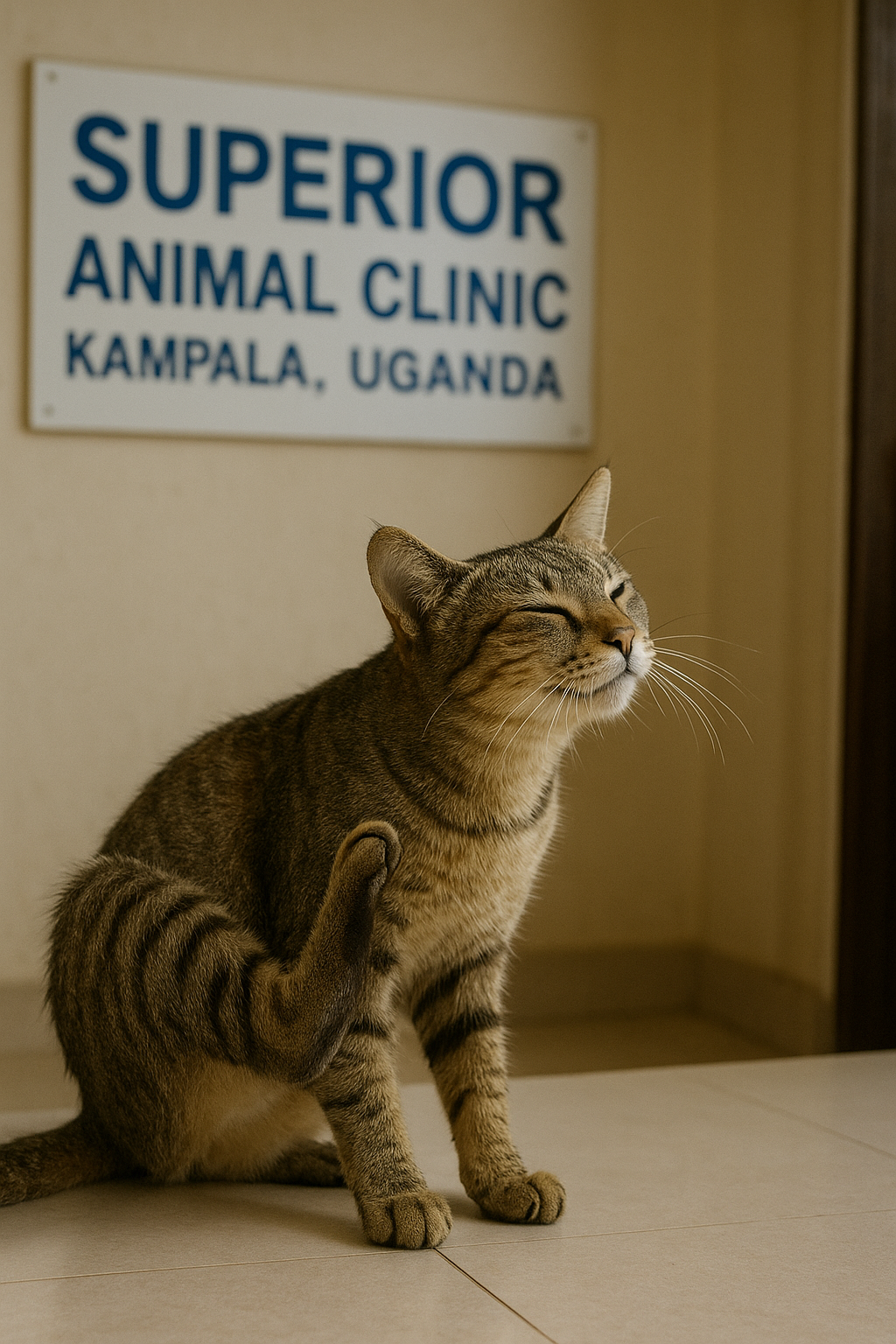
Cats are known for their calm elegance, but when constant scratching takes over, that grace quickly turns into worry for many pet owners in Kampala. From Ntinda and Old Kampala to Makindye, Buziga, Munyonyo, Muyenga, and Rubaga, countless cat owners face the same challenge — a beloved pet struggling with nonstop itching and skin irritation.
In Uganda, scratching in cats is more than just a habit. It often signals deeper problems like fleas, mites, allergies, fungal infections, or nutritional deficiencies. Left untreated, these issues can worsen, causing hair loss, painful sores, or even infections that spread to humans.
At Superior Animal Clinic along Salaama Road, Makindye, we help cat owners every day find quick, lasting relief for their cats. With expert diagnosis, advanced treatments, and personalized care, we’ve become the trusted veterinary clinic for scratching treatment across all neighborhoods in and around Kampala.
This article will guide you through everything you need to know about scratching in cats — the common causes, effective treatments, home remedies, prevention tips, and why Superior Animal Clinic is the number one choice for cat owners seeking help.
Why is My Cat Scratching So Much?
Many cat owners in Kampala and surrounding areas like Ntinda, Old Kampala, Kasubi, Nsambya, Katwe, Zana, Makindye, Muyenga, Bugolobi, and Munyonyo often ask, “Why is my cat scratching all the time?” The truth is, scratching in cats is rarely just a habit — it is usually a sign of an underlying health problem that needs attention.
Here are the most common reasons cats scratch excessively in Uganda:
1. Fleas and Ticks
Flea infestations are the number one cause of scratching in cats in Kampala. Fleas thrive in Uganda’s warm climate, especially in areas with many stray animals like Kasubi, Katwe, and Nsambya. Even indoor cats can pick up fleas if you have other pets or if strays come close to your compound. Flea bites cause intense itching, skin irritation, and sometimes allergic reactions.
2. Ear Mites
If your cat keeps scratching around the ears or shaking its head, ear mites may be the culprit. These microscopic parasites cause extreme discomfort and can lead to ear infections if untreated. They are very common in cats across Makindye, Ndejje, and Rubaga where cats roam outdoors.
3. Ringworm and Fungal Infections
Despite the name, ringworm is not a worm — it’s a fungal infection that causes circular patches of hair loss, scaly skin, and relentless scratching. Ringworm is common in Uganda, particularly in multi-cat households or where cats interact with strays.
4. Food and Environmental Allergies
Just like humans, cats can develop allergies. Some cats react to certain foods (like fish, milk, or cheap cat kibble), while others react to dust, pollen, or cleaning chemicals in the home. These allergies often cause constant scratching, red skin, or overgrooming.
5. Bacterial Skin Infections
When cats scratch too much, the skin breaks open and allows bacteria to enter. This can lead to painful infections with redness, swelling, and pus-filled sores. Infections are more common in cats that live in humid environments like Nakawa, Bugolobi, and Muyenga.
6. Stress and Behavioral Causes
Sometimes scratching has less to do with skin problems and more to do with the cat’s emotional state. Cats under stress — whether from moving homes, introduction of a new pet, or loneliness — may overgroom or scratch as a coping mechanism.
7. Poor Nutrition
Cats fed on low-quality or unbalanced diets may develop weak skin and poor immunity. This makes them more prone to irritation, dandruff, and scratching. Many cases we see at Superior Animal Clinic in Makindye improve significantly once the cat is placed on a balanced, high-protein, omega-rich diet.
8. Dry Skin and Harsh Weather
Kampala’s hot, dusty conditions — especially in areas like Lubowa, Seguku, and Mutundwe — can cause cats to develop dry, flaky skin. Cats with dry skin scratch frequently, and if not treated, this can lead to open sores.
9. Contact Dermatitis (Skin Reactions)
Sometimes scratching is caused by contact with irritating substances such as harsh cleaning chemicals, perfumed soaps, or even certain types of carpets or bedding. Cats with sensitive skin in urban areas like Ntinda, Nakasero, and Kololo are more prone to this.
10. Worm Infestations
While worms mostly affect the stomach, severe worm infestations can also cause itching around the anus, leading cats to scratch and groom excessively. This is common in cats that are not regularly dewormed.
11. Skin Tumors or Growths
Occasionally, cats scratch at lumps, bumps, or tumors that irritate their skin. These growths may be benign (harmless) or signs of something more serious like cancer. Early veterinary checks at Superior Animal Clinic are crucial in these cases.
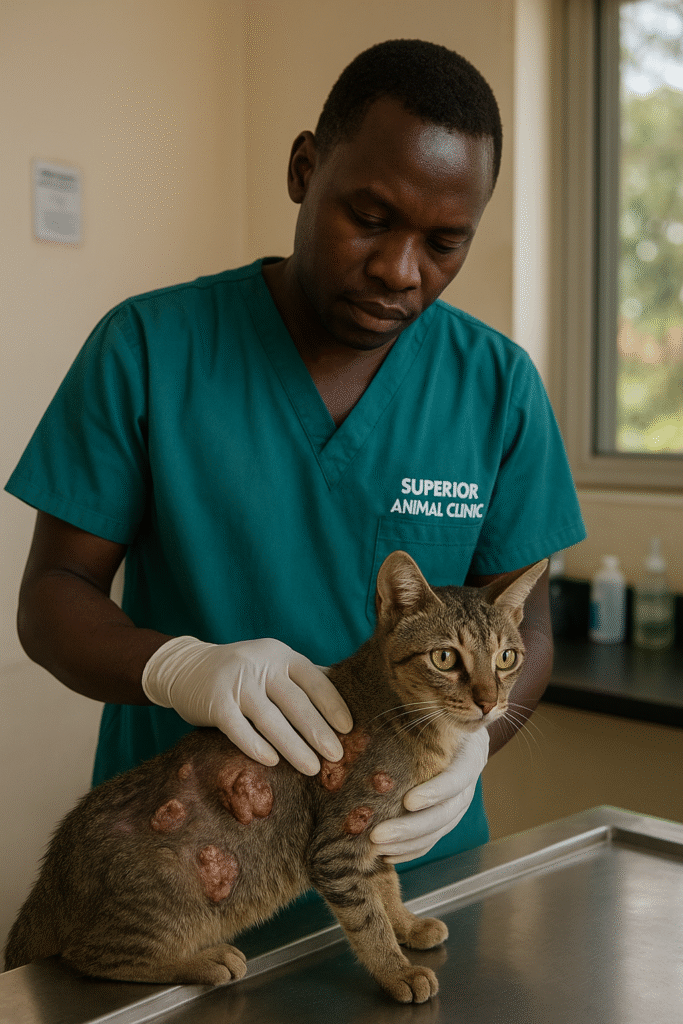
12. Seasonal Allergies
Just like humans, cats in Uganda can develop seasonal allergies to pollen, dust, or mold. These allergies are especially common during the rainy season in areas like Buziga, Munyonyo, and Muyenga where vegetation is dense.
13. Secondary Skin Problems from Other Diseases
Cats with chronic illnesses such as Feline Immunodeficiency Virus (FIV), Feline Leukemia Virus (FeLV), or diabetes may have weaker immune systems, making them more prone to skin infections and scratching.
14. Poor Grooming or Lack of Care
Cats that are not groomed regularly, especially long-haired breeds like Persians or Maine Coons, often develop matted fur. This traps dirt, fleas, and bacteria close to the skin, leading to scratching.
15. Hormonal Imbalances
Conditions such as hyperthyroidism or hormonal skin disorders can cause skin irritation and itchiness. While less common, these are still important to check when other causes are ruled out.
✅ Key Takeaway for Cat Owners in Kampala:
If your cat is scratching constantly, don’t ignore it. Scratching is not just a nuisance — it is a warning sign that your cat has fleas, mites, allergies, infections, or another health issue that needs treatment. The earlier you bring your cat to Superior Animal Clinic, the faster we can relieve the itching and prevent serious complications.
Step-by-Step Cat Scratching Treatment at Superior Animal Clinic
At Superior Animal Clinic, Makindye (Salaama Road, Kampala), we know how frustrating it is to see your cat scratching non-stop. That’s why we have designed a step-by-step treatment process to make sure your cat gets the right diagnosis, effective treatment, and long-lasting relief. Here’s how we do it:
Step 1: Thorough Examination
When you bring your cat in, our vets first conduct a full physical examination. We check the skin, fur, ears, and paws carefully to look for fleas, mites, infections, or signs of allergies. We also ask you about your cat’s history — diet, home environment, and when the scratching started.
Step 2: Diagnostic Testing (If Needed)
If the cause is not immediately clear, we perform tests such as:
- Skin scrapings – to detect mites or fungal infections.
- Fungal cultures – to confirm ringworm.
- Ear swabs – to check for ear mites or bacterial infections.
- Allergy tests – if we suspect food or environmental allergies.
- Blood tests – if we need to rule out hormonal or immune-related issues.
This helps us pinpoint the exact reason behind the scratching instead of guessing.
Step 3: Customized Treatment Plan
Once we identify the cause, we create a tailored treatment plan for your cat. Common treatments include:
- Anti-parasite treatments – topical or injectable medicines (like ivermectin or selamectin) to kill fleas, ticks, and mites.
- Antifungal medications – creams, shampoos, or oral drugs like ketoconazole or itraconazole for ringworm.
- Antibiotics – to treat bacterial skin infections caused by excessive scratching.
- Ear mite treatments – ear drops or medicated solutions to clear infestations.
- Allergy management – changing diets, prescribing antihistamines, or providing steroid treatments in severe cases.
- Nutritional support – supplements rich in omega-3 fatty acids to improve skin and coat health.
Step 4: Cat Owner Guidance and Home Care
We don’t just treat your cat and send you home — we guide you step by step on how to care for your cat afterwards. This includes:
- How to clean and disinfect your cat’s bedding and environment.
- What foods to avoid if your cat has allergies.
- Grooming tips to prevent recurrence.
- Home remedies that are safe to use alongside treatment.
Step 5: Follow-Up Visits
Scratching can sometimes come back if not fully treated. That’s why we schedule follow-up appointments to monitor your cat’s progress. If needed, we adjust the treatment plan to make sure your cat heals completely.
Step 6: Long-Term Prevention
Finally, we help you prevent scratching from returning by:
- Setting up a regular flea and tick prevention program.
- Recommending balanced diets that promote healthy skin.
- Offering routine check-ups to catch problems early.
✅ Why Cat Owners Choose Superior Animal Clinic
Unlike other clinics, we don’t just treat the symptoms — we find the cause, provide lasting solutions, and educate pet owners on keeping their cats itch-free.
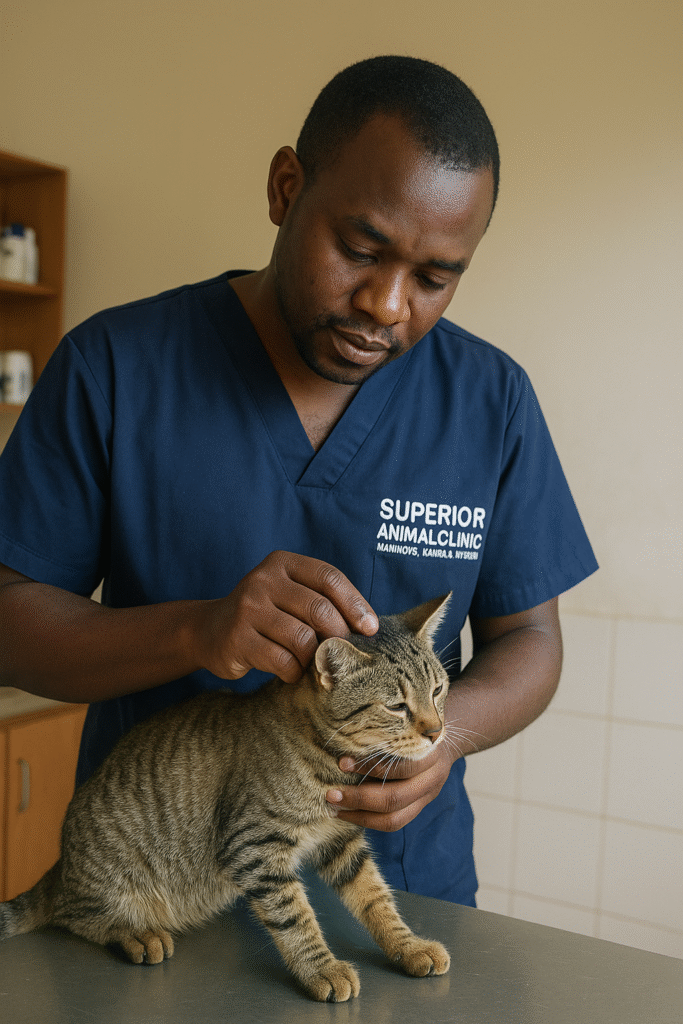
Drugs and Methods Used in Kampala for Scratching
At Superior Animal Clinic, Makindye (Salaama Road, Kampala), we use safe, effective, and veterinarian-approved drugs to treat scratching in cats. The treatment depends on the exact cause, which we confirm through proper examination and diagnostic testing. Below are the main categories of drugs and methods we use:
1. Anti-Parasitic Drugs (For Fleas, Ticks, and Mites)
Parasites are the leading cause of scratching in cats in Kampala. We use:
- Selamectin (Revolution®/Stronghold®) – a topical solution applied monthly to kill fleas, ear mites, ticks, and intestinal worms.
- Ivermectin – injections or oral medication effective against ear mites and mange.
- Fipronil (Frontline®) – a topical solution that provides long-lasting flea and tick control.
- Bravecto® (Fluralaner) – a chewable or topical that protects cats from fleas and ticks for up to 12 weeks.
✅ These treatments are essential for cats from high-risk areas like Kasubi, Katwe, Nsambya, and Ndejje, where fleas and mites are very common.
2. Antifungal Medications (For Ringworm and Fungal Infections)
Ringworm is common in Uganda and highly contagious. We treat it with:
- Itraconazole – the most effective oral antifungal for cats with ringworm.
- Ketoconazole – an alternative antifungal, given orally or topically.
- Topical antifungal creams/shampoos – such as miconazole or lime sulfur dips, to reduce fungal load on the skin and fur.
✅ These are especially important for cats in multi-cat homes or in areas with stray cat exposure like Munyonyo, Muyenga, and Rubaga.
3. Antibiotics (For Bacterial Skin Infections)
When scratching leads to wounds and secondary infections, we prescribe:
- Amoxicillin-Clavulanate (Clavamox®) – broad-spectrum antibiotic for skin and wound infections.
- Cephalexin – effective for staphylococcal skin infections.
- Enrofloxacin (Baytril®) – used in resistant or deep bacterial infections.
✅ These antibiotics are usually paired with antiseptic shampoos or sprays to clean infected skin.
4. Anti-Allergy Treatments (For Food and Environmental Allergies)
Allergic cats often scratch non-stop. We manage allergies with:
- Antihistamines (such as chlorpheniramine or cetirizine) to reduce itching.
- Corticosteroids (prednisolone injections or tablets) for severe flare-ups, but used short-term to avoid side effects.
- Hypoallergenic diets – veterinary diets that eliminate common food allergens (fish, dairy, low-grade kibble).
✅ Cats in urban areas like Ntinda, Nakasero, Kololo, and Bugolobi are more prone to food and environmental allergies.
5. Nutritional Supplements (For Skin and Coat Health)
Sometimes scratching is worsened by poor diet. We recommend:
- Omega-3 fatty acids (from salmon oil or supplements) to reduce skin inflammation.
- Vitamin E supplements to promote healthy skin healing.
- High-protein commercial cat foods designed for skin support.
✅ Cats fed on leftover household food or cheap kibble in Makindye, Mutundwe, and Ndejje often benefit most from these.
6. Supportive and Home Care Methods
In addition to medications, we guide owners on safe home care, including:
- Medicated shampoos (containing chlorhexidine, miconazole, or sulfur) to relieve itching and kill surface microbes.
- Coconut oil (sparingly used) to soothe mild dry skin.
- Environmental cleaning – spraying pet-safe flea control in bedding and carpets, washing cat blankets, and disinfecting the home.
✅ Why Our Method Works
At Superior Animal Clinic, we don’t just give random medicine. We diagnose the exact cause of scratching first, then use the right drug at the right dosage for your cat’s specific condition. This ensures fast relief, safe treatment, and no recurrence.
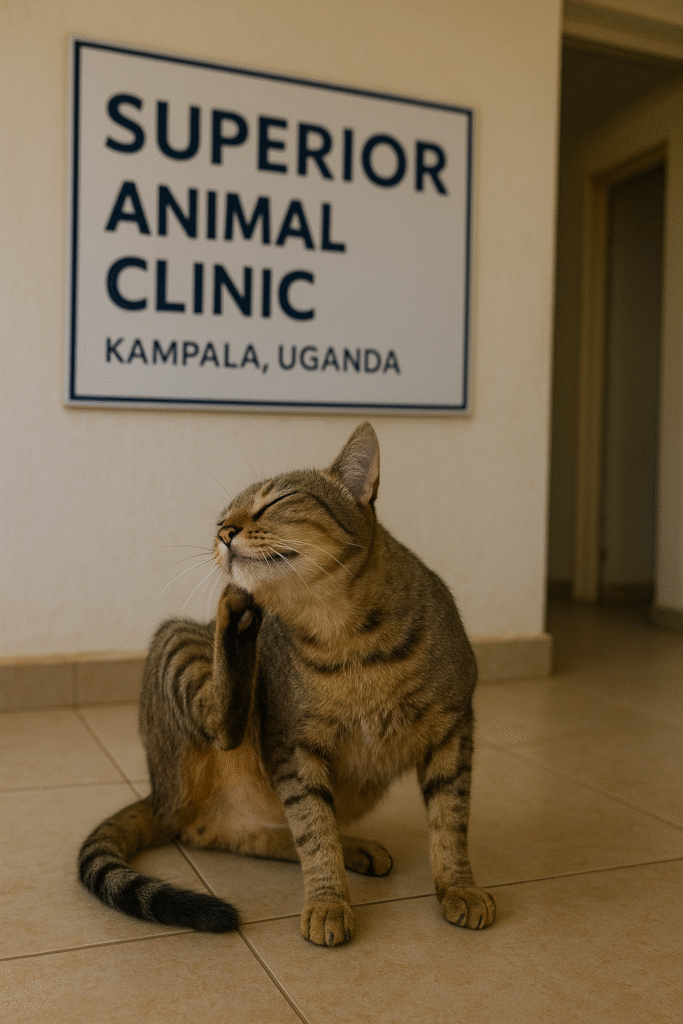
Which Cats Are More Prone to Scratching in Kampala, Uganda
Not all cats scratch equally. In Kampala, some cats are more prone to scratching due to breed, age, lifestyle, or environmental factors. Understanding which cats are at higher risk can help you take preventive measures and seek timely veterinary care at Superior Animal Clinic, Makindye (Salaama Road, Kampala).
1. Cats Living in High-Risk Neighborhoods
Cats living in areas with high flea and parasite exposure are more likely to scratch:
- Kasubi, Katwe, Nsambya, and Ndejje – areas with many stray cats and less controlled outdoor spaces.
- Makindye, Muyenga, Munyonyo, Buziga, and Rubaga – densely populated neighborhoods where fleas, ticks, and mites spread easily.
- Urban centers like Ntinda, Old Kampala, Kololo, Nakasero, and Bugolobi – cats here may develop allergies from pollution, dust, and environmental irritants.
Cats in these areas benefit greatly from regular veterinary check-ups, parasite control, and preventive care.
2. Outdoor vs. Indoor Cats
- Outdoor cats are at a higher risk of scratching because they are more exposed to fleas, ticks, mites, and contact with strays.
- Indoor cats are generally safer but can still scratch due to allergies, poor nutrition, stress, or hidden mites.
At Superior Animal Clinic, we treat both indoor and outdoor cats, tailoring prevention strategies for each lifestyle.
3. Long-Haired Breeds
Long-haired cats are especially prone to scratching because:
- Their fur traps dirt, fleas, and bacteria, leading to irritation.
- Grooming becomes harder, and mats can form, which increase itching and scratching.
Common long-haired breeds in Kampala include:
- Persians – very popular in Makindye and Kololo.
- Maine Coons – gaining popularity in Ntinda and Bugolobi.
- Ragdolls and British Longhairs – often kept in indoor apartments in high-density areas.
4. Cats with Allergies or Sensitive Skin
Some cats have genetic or acquired sensitivities to food, dust, or environmental allergens:
- Cats fed low-quality or inconsistent diets in areas like Mutundwe, Lubowa, and Bukoto often develop food allergies.
- Cats exposed to polluted air, household cleaning chemicals, or pollen in neighborhoods like Kololo, Ntinda, and Old Kampala are more likely to have skin reactions and scratch.
5. Kittens and Senior Cats
- Kittens are more prone to parasites like fleas and mites, as their immune system is not fully developed.
- Senior cats may develop dry skin, hormonal changes, or chronic illnesses, making them scratch more frequently.
Both age groups require careful monitoring and preventive care, which is why Superior Animal Clinic emphasizes early veterinary intervention.
6. Cats with Poor Grooming or Weak Immunity
- Cats that are not groomed regularly, especially long-haired breeds, are at higher risk.
- Cats with weakened immunity due to illness, poor diet, or stress are more susceptible to infections, fungal diseases, and allergies, leading to scratching.
✅ Key Takeaway for Cat Owners in Kampala:
Scratching isn’t random — it’s often linked to your cat’s breed, lifestyle, age, and environment. Cats from high-risk areas like Kasubi, Katwe, Nsambya, Makindye, Muyenga, Buziga, Ntinda, Kololo, and Old Kampala need proactive care. At Superior Animal Clinic, we specialize in identifying at-risk cats and providing personalized treatment and prevention plans, ensuring your cat stays itch-free and healthy.
Best Foods for Cats with Scratching in Kampala, Uganda
Nutrition plays a critical role in your cat’s skin health and coat condition. At Superior Animal Clinic, Makindye (Salaama Road, Kampala), we often see cats whose scratching problems improve dramatically once their diet is corrected. Here’s a guide to the best foods for cats experiencing scratching or skin irritation in Uganda.
1. High-Quality Protein Sources
Cats are obligate carnivores, which means their skin and coat need protein from animal sources. Feeding your cat low-quality food or leftovers can weaken the skin, making it more prone to scratching.
Recommended protein foods for cats in Kampala:
- Chicken or turkey – cooked or high-quality canned/preserved forms.
- Fish – especially salmon, sardines, or mackerel, which also provide essential fatty acids.
- Commercial high-protein cat food – ensure the first ingredient is a named meat source (e.g., chicken, fish, beef).
✅ Many cats from Ntinda, Old Kampala, Makindye, and Muyenga show improved skin and reduced scratching after switching to protein-rich diets.
2. Omega-3 and Omega-6 Fatty Acids
Fatty acids are essential for reducing inflammation, soothing itchy skin, and improving coat shine.
Sources for cats in Uganda:
- Salmon oil or fish oil supplements – small, vet-approved doses.
- High-quality commercial diets enriched with omega fatty acids.
- Egg yolks – occasional addition for home-cooked meals.
✅ Omega-rich diets are especially useful for cats with allergy-related scratching in areas like Buziga, Munyonyo, and Bugolobi.
3. Hypoallergenic and Limited-Ingredient Diets
Some cats scratch due to food allergies. In Uganda, common allergens include fish, beef, and low-quality kibble.
Tips for hypoallergenic feeding:
- Use single-protein diets (e.g., chicken-only or turkey-only).
- Novel protein diets like rabbit, duck, or venison can reduce allergic reactions.
- Avoid artificial colors, preservatives, and low-quality fillers.
✅ Cats in neighborhoods with high incidence of food allergies, like Kololo, Naguru, and Nakasero, benefit most from hypoallergenic diets.
4. Moisture-Rich Foods
Dehydration can lead to dry, itchy skin, worsening scratching. Many cats in Kampala do not drink enough water.
Solutions:
- Wet canned food – helps increase hydration naturally.
- Broths or gravies – vet-approved, low-salt options.
- Always ensure fresh, clean water is available at all times.
5. Supplements for Skin and Coat Health
When diet alone isn’t enough, we recommend safe supplements:
- Vitamin E – supports skin healing.
- Biotin – strengthens hair follicles.
- Zinc supplements – correct deficiencies causing hair loss or flakiness.
Foods to Avoid in Cats with Scratching
- Low-quality kibble with fillers like maize or wheat.
- Artificial colorants and preservatives.
- Foods your cat has previously reacted to (common allergens include fish and beef).
- Excessive dairy or human snacks, which can trigger allergies.
✅ Key Takeaway for Cat Owners in Kampala:
Feeding your cat high-protein, hypoallergenic, and omega-rich foods can dramatically reduce scratching and improve skin health
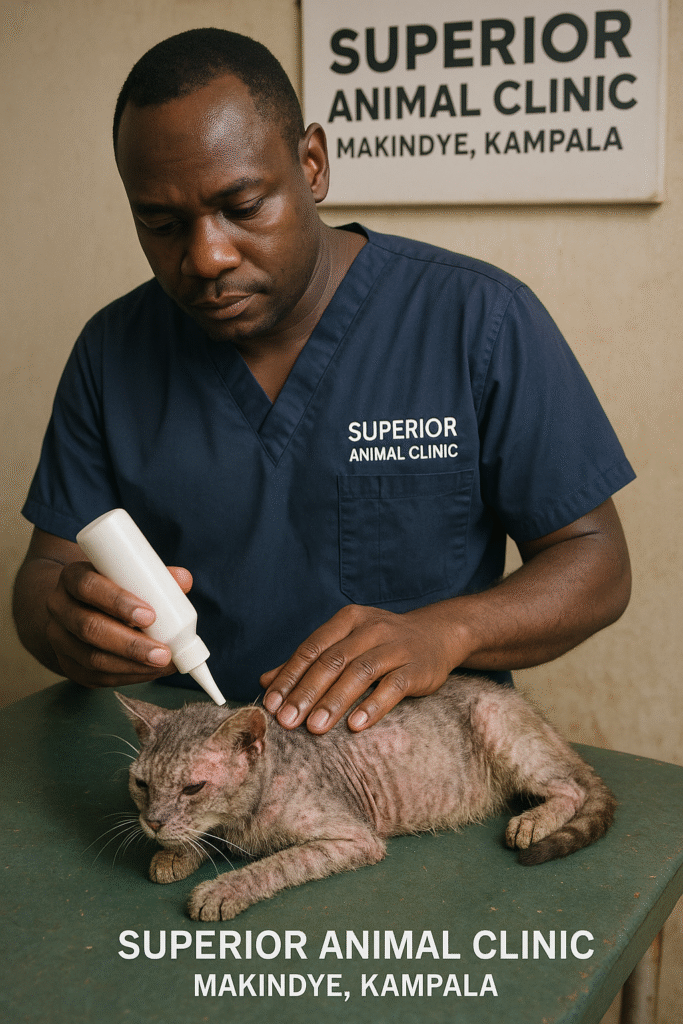
Home Remedies for Cat Scratching
Some cat owners in Uganda try home remedies, such as:
- Bathing with mild medicated shampoos (recommended by your vet).
- Applying coconut oil to soothe mild irritation.
- Cleaning ears with vet-approved solutions for ear mites.
⚠️ However, home remedies should not replace professional veterinary care. Some remedies worsen the condition. Always consult Superior Animal Clinic first.
What Happens if You Do Not Treat Cat Scratching?
If left untreated, scratching in cats can lead to:
- Severe skin infections
- Permanent hair loss
- Spread of ringworm to humans and other pets
- Extreme discomfort and stress for your cat
How to Prevent Cat Scratching in Uganda
- Regular flea and tick control (monthly treatments).
- Keeping your cat indoors or in clean environments.
- Feeding high-quality food.
- Regular grooming to detect skin issues early.
- Bringing your cat for routine check-ups at Superior Animal Clinic.
Areas in Kampala Where Cat Scratching is Common
Scratching cases are more common in Kasubi, Katwe, Ndejje, Nsambya, and Nakawa, due to high numbers of stray cats and poor flea control. However, we also receive many cases from Ntinda, Muyenga, Naguru, Bugolobi, Munyonyo, and Makindye, where pet owners keep indoor cats but still struggle with allergies or mites.
FAQs – Cat Scratching in Kampala
Q1: Why is my cat scratching so much in Kampala?
Excessive scratching in cats in Kampala is usually caused by fleas, ticks, mites, fungal infections, allergies, or poor nutrition. Cats in areas like Ntinda, Makindye, Kasubi, Nsambya, Katwe, Zana, and Rubaga are particularly prone due to outdoor exposure and environmental factors. Visiting Superior Animal Clinic ensures proper diagnosis and treatment.
Q2: Can scratching in cats be dangerous for humans in Kampala?
Yes. Scratching caused by ringworm, fleas, or mites can spread to humans, especially children. Treating your cat promptly at Superior Animal Clinic, Makindye protects your whole family.
Q3: What is the best veterinary clinic in Kampala for cat scratching treatment?
Superior Animal Clinic in Makindye along Salaama Road is the top choice for cat owners in Ntinda, Old Kampala, Makindye, Muyenga, Buziga, Munyonyo, Nakawa, Rubaga, Kololo, and surrounding neighborhoods. We provide expert diagnosis, customized treatment plans, and follow-up care.
Q4: How long does it take to treat cat scratching in Kampala?
Treatment duration depends on the cause:
- Fleas and mites: 1–2 weeks with topical or oral medication.
- Ringworm or fungal infections: 3–6 weeks with antifungal treatments.
- Allergies: Ongoing management with diet changes and medications.
Regular follow-up at Superior Animal Clinic ensures your cat heals fully and prevents recurrence.
Q5: Can I treat my cat’s scratching at home in Kampala?
While some home remedies like medicated shampoos or coconut oil can soothe mild irritation, most scratching requires professional veterinary care to address the underlying cause. Visiting Superior Animal Clinic, Makindye guarantees safe and effective treatment.
Q6: What are the most common causes of cat scratching in Kampala?
The top causes in Kampala include:
- Fleas, ticks, and mites
- Ringworm and fungal infections
- Food and environmental allergies
- Stress or behavioral issues
- Poor diet and nutritional deficiencies
Cats in neighborhoods like Kasubi, Katwe, Nakasero, Bugolobi, and Ndejje are especially affected due to exposure to stray animals and environmental allergens.
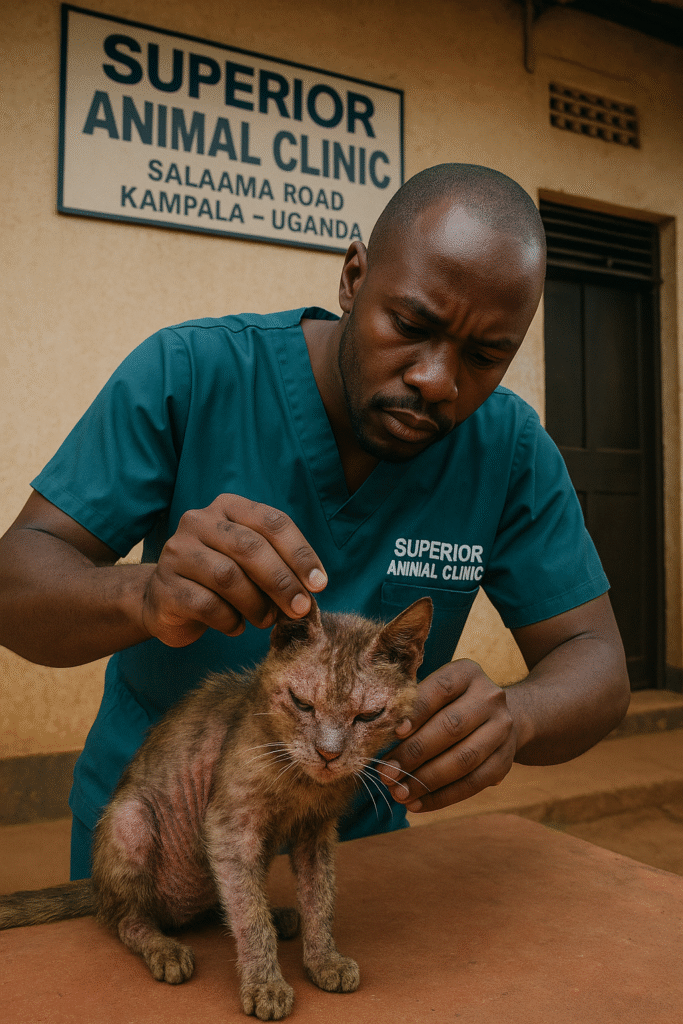
Q7: How can I prevent scratching in my cat in Kampala?
- Regular flea and tick prevention (monthly treatments)
- Balanced, high-quality diet rich in proteins and omega fatty acids
- Routine grooming and cleaning of bedding
- Environmental hygiene to reduce exposure to mites and allergens
- Regular vet check-ups at Superior Animal Clinic
Q8: What foods are best for cats with scratching in Kampala?
- High-protein diets (chicken, turkey, fish)
- Omega-rich foods or supplements
- Hypoallergenic or limited-ingredient diets for cats with food allergies
- Wet or canned food to maintain hydration
Avoid low-quality kibble, artificial additives, and common allergens.
Q9: What treatments does Superior Animal Clinic use for cat scratching in Kampala?
- Anti-parasitic drugs (Selamectin, Ivermectin, Fipronil)
- Antifungal medications (Ketoconazole, Itraconazole, medicated shampoos)
- Antibiotics (Amoxicillin-Clavulanate, Cephalexin)
- Allergy management (antihistamines, steroids, hypoallergenic diets)
- Nutritional support (omega-3 supplements, high-quality diets)
Q10: Is scratching in cats treatable in all neighborhoods of Kampala?
Yes! Superior Animal Clinic treats cats from Ntinda, Old Kampala, Makindye, Kasubi, Nsambya, Katwe, Zana, Nakasero, Buziga, Munyonyo, Nakawa, Rubaga, Muyenga, Naguru, Bugolobi, Kabowa, Kabojja, Lugogo, Lubowa, Seguku, Ndejje, Kololo, Mutundwe, Bukoto, Bulindo, and Kulambiro with safe, effective, and lasting solutions for scratching.
Q11: What happens if I don’t treat my cat’s scratching in Kampala?
Untreated scratching can lead to severe skin infections, permanent hair loss, spread of ringworm, and extreme discomfort. Cats may also develop stress-related behaviors or secondary infections. Early treatment at Superior Animal Clinic, Makindye prevents these complications.
Q12: Are some cats more prone to scratching in Kampala?
Yes. Cats that are more prone include:
- Long-haired breeds like Persians and Maine Coons
- Cats living outdoors or in areas with many stray animals (Kasubi, Katwe, Nsambya)
- Cats with weakened immunity or poor diets
- Cats exposed to allergens or stressful environments
Q13: Can scratching be a sign of serious illness in cats in Kampala?
Yes. Scratching can sometimes indicate ringworm, severe allergies, parasitic infestations, hormonal disorders, or immune system problems. Visiting Superior Animal Clinic ensures proper diagnosis and prevents serious health issues.
Q14: How can I care for my cat at home after scratching treatment in Kampala?
- Follow vet-prescribed medications exactly as directed
- Regularly clean bedding and litter areas to prevent reinfestation
- Use medicated shampoos only if recommended
- Maintain a balanced diet for skin health
- Monitor for signs of relapse and visit Superior Animal Clinic if scratching returns
Q15: Are home remedies effective for cat scratching in Kampala?
Some home remedies, like mild medicated shampoos or coconut oil, can soothe irritation, but they cannot treat the root cause. Professional treatment at Superior Animal Clinic, Makindye is always recommended to prevent recurrence.
Q16: How often should I bring my cat for check-ups to prevent scratching?
We recommend routine veterinary visits every 3–6 months, especially in areas prone to parasites like Buziga, Munyonyo, Muyenga, and Rubaga. Early detection helps prevent scratching before it becomes severe.
Q17: Can diet changes reduce scratching in cats in Kampala?
Absolutely. Switching to high-protein, hypoallergenic, omega-rich diets can reduce skin inflammation and itching. Cats in Ntinda, Old Kampala, Makindye, and Bugolobi often show improvement within weeks.
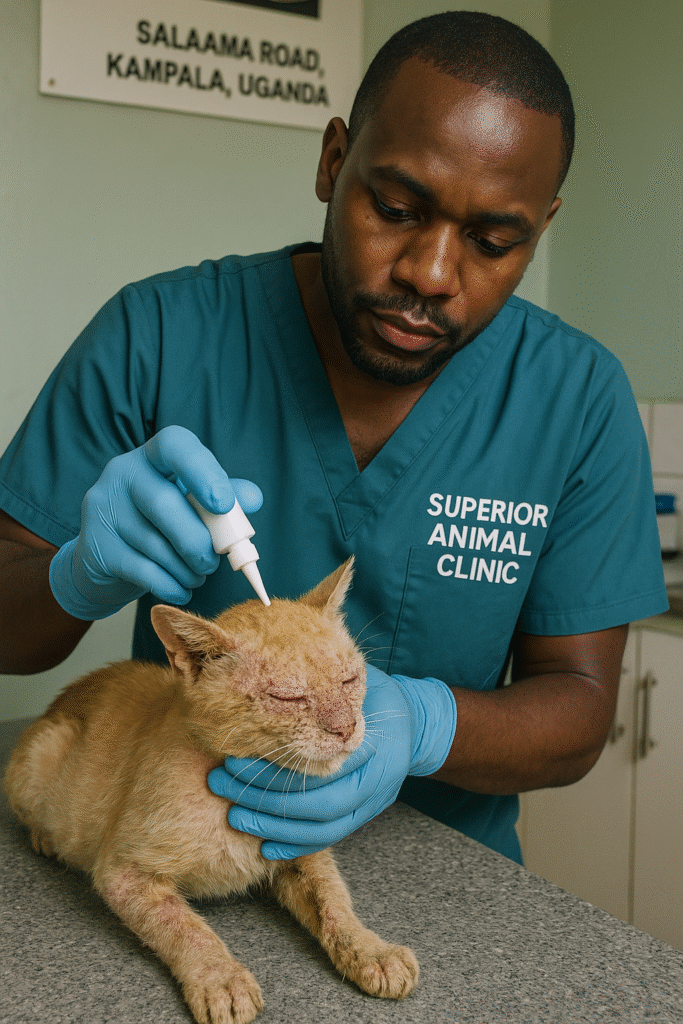
Q18: Which drugs are safest for treating scratching in cats in Kampala?
At Superior Animal Clinic, we use vet-approved medications such as:
- Selamectin, Ivermectin, and Fipronil for parasites
- Ketoconazole or Itraconazole for fungal infections
- Amoxicillin-Clavulanate for bacterial infections
- Antihistamines and corticosteroids for allergies
These medications are safe when prescribed and monitored by our veterinarians.
Q19: Can scratching spread between cats in Kampala?
Yes. Fleas, mites, and fungal infections like ringworm can easily spread between cats in multi-cat homes or neighborhoods like Kasubi, Katwe, and Nsambya. Treating all cats in the household and cleaning the environment is essential.
Q20: Why choose Superior Animal Clinic for cat scratching treatment in Kampala?
We provide:
- Expert diagnosis and testing for accurate treatment
- Tailored treatment plans for every cat
- Follow-up care to ensure lasting relief
- Advice on diet, grooming, and prevention
Cat owners from Ntinda, Old Kampala, Kasubi, Makindye, Muyenga, Buziga, Munyonyo, Rubaga, Kololo, and surrounding areas trust us for safe, effective, and permanent solutions.
Final Word
If your cat is scratching non-stop, don’t wait. Scratching in cats is not normal and always has an underlying cause. At Superior Animal Clinic, we are committed to helping cats in Ntinda, Old Kampala, Kasubi, Nsambya, Katwe, Zana, Nakasero, Makindye, Buziga, Munyonyo, Nakawa, Rubaga, Muyenga, Naguru, Bugolobi, Kabowa, Kabojja, Lugogo, Lubowa, Seguku, Ndejje, Kololo, Mutundwe, Bukoto, Bulindo, and Kulambiro live itch-free, healthy, and happy lives.
👉 Call or visit us today at Superior Animal Clinic, Makindye – Salaama Road, Kampala for the best scratching treatment for cats in Uganda.

Just did the phwinslotlogin. Easy to register, but like they say, be careful when you bet. I mean, it’s exciting, but don’t bet the house, okay?
I don’t think the title of your article matches the content lol. Just kidding, mainly because I had some doubts after reading the article.